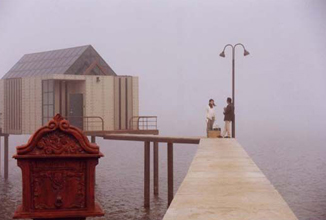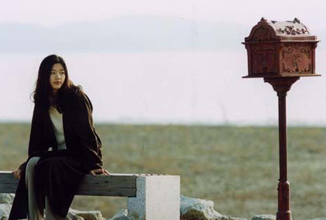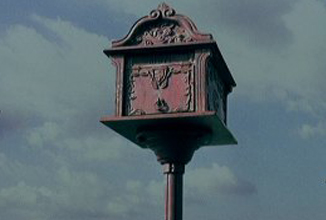"We are tormented because love goes on, not because it goes away... Love is a self-inflicted pain."
Synopsis:
Il Mare, Italian for 'the sea', is a beautiful beach-front house where Eun-joo (Jeon Ji-hyun) has lived for the past year or so. On moving to an apartment in the city, she leaves a Christmas card in the mailbox for Il Mare's next tenant wishing them happiness there and asking them to forward any of her mail to her new address. She also dates the card 'December, 1999' and apologises for the paw prints by the door, explaining that they were already there when she moved in.
Sung-hyun (Lee Jung-jae) moves into Il Mare and, on checking the mailbox, finds Eun-joo's card. As the house has only recently been built, and he is the first person to live there, he replies to her card stating that there must be some address mix-up and notes that the year is actually 1997. A couple of days later a stray dog leaves paw prints in some spilt paint by the door and this, combined with further correspondence via the mailbox, leads Eun-joo and Sung-hyun to the realisation that they are, in fact, living in different times - Sung-hyun in 1997, Eun-joo in 1999. As they gradually get to know each other through their letters, via the mystical mailbox, feelings between them start to develop and inevitably they reach the point where they decide it's time to meet in person. However, though the date they set is only a week away for Eun-joo, Sung-hyun will have to wait a whole two years, and both of them are soon to discover that time can change everything...
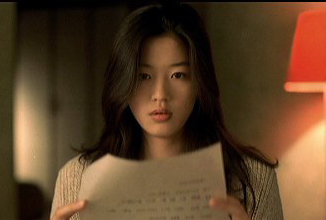 |
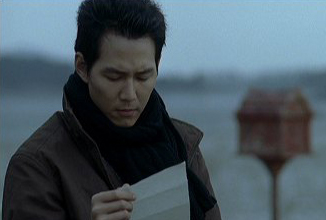 |
Review:
If the story of two characters separated in time, communicating by some other-worldly anomaly, sounds familiar that's because it has been used by Hollywood several times, but it should be noted that those American movies followed the purchase of the international remake rights of Il Mare - which was the fourth South Korean film to have its international rights bought by a USA film company. The Lake House, starring the emotionally bereft Keanu Reeves and remake queen Sandra Bullock, is the official Hollywood re-make of Il Mare, with films such as Frequency taking the main premise and changing the plot from a love story to a sci-fi/action outing. As such, Il Mare should be viewed as the original and it goes without saying that its gentle beauty and emotional resonance outstrip all of the clones massively.
Almost as soon as we are introduced to Eun-joo and Sung-hyun it is pretty clear that both are dealing with issues of abandonment and regrets of the past. Eun-joo is desperately clinging to the hope that she can rescue and rekindle the relationship she had with her (ex)boyfriend, and in the early stages of the mailbox correspondences with Sung-hyun she seems to almost see him as a comfort rather than a possible future relationship. None of the heartache she feels is actually her fault - her decisions, and her acceptance of others’ decisions, were what she believed were the right things to do at the time - but her fear that she’s the one at fault and the feeling she has of needing to fix what she sees as her mistakes has stayed with her. Her statement "I guess I was expecting too much, again" really hits the nail on the head in describing the effect which the hurt that she has suffered has had on her belief in hopes and dreams and when she finally realizes what she truly wants, she is once again left racing to fix a situation which she blames herself for causing.
Sung-hyun's most obvious issues stem from his father leaving him when he was a child but reference is also made to previous relationship heartaches - a female friend who visits him at Il Mare states "I think I should learn to mend hearts first" when she is discussing going to study abroad (a statement clearly aimed at Sung-hyun which causes him to back away noticeably) - and though it is left to viewers to draw their own conclusions as to the specifics of that situation it is clear that the baggage he carries as a result affects the current choices he makes to a large degree. Twice, before he and Eun-joo arrange to meet, he sits by her (that is, the 1998 Eun-joo who obviously wouldn't be aware of who he is) at the train station and is unable to say anything, and when she asks him for help in one of her letters he agrees but instantly steps back from the relationship, ending his reply by saying goodbye. His willingness to set aside his needs and desires is partly so that the girl he loves can find happiness and partly to prevent himself being hurt more than he already has been.
Eun-joo and Sung-hyun are essentially suffering from the same problem albeit from two very different perspectives. Eun-joo can't leave the past behind no matter how hard she tries - her past relationship haunts her and even her new relationship is two years in the past - and Sung-hyun spends most of his time pining for the future both in terms of his relationship with Eun-joo and also in his career. Neither scenario brings them any comfort and it isn't until they put the past to rest, stop relying on hopes that in the future everything will miraculously be ok and start focusing on the present that they have any chance of finding true happiness.
Eun-joo and Sung-hyun's decision to meet in person comes quite late in the course of their correspondences and though many in their position would have made the arrangement much earlier, our two characters are so gun-shy that the timing is understandable, and indeed all the more believable. Of course, from a plot point of view, Eun-joo and Sung-hyun being kept apart until this point is also pivotal to the conclusion of the film.
 |
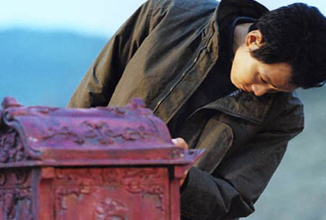 |
The plot of Il Mare builds tantilisingly slowly but never drags or feels labored. The blossoming relationship between Eun-joo and Sung-hyun is allowed to grow naturally and the love, and heartache, which exudes from the characters is almost palpable.
The cinematography used throughout the film is also utterly stunning. The incredibly beautiful beach on which Il Mare is situated is used to full effect - the long, luxurious sweeps of the camera and the breathtaking panoramic sunset scenes evoke a feeling of longing even before either of our characters appear for the first time. Director Lee Hyeon-seung fills the screen with sumptuous exterior and interior shots and takes pains to ensure that even the smallest details each play a memorable part - from the floating away of a pair of mittens to the releasing of a fish into the sea - the tiniest apparent trivialities regularly mirror the characters’ unspoken feelings, and, as for the mailbox itself, its design is utterly inspired and, dare I say, magical.
Il Mare is unashamedly romantic through and through but, like many top notch South Korean films, totally supplants viewer genre expectations. The plot has everything which a true romance should have but never resorts to being sappy, warmth exudes from the characters, the dialogue and the screen imagery and the whole films feels like it could be real - quite something considering the other-worldliness of the story.
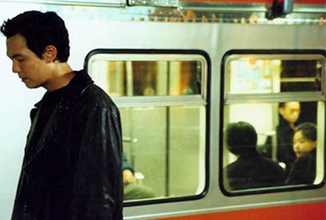 |
 |
Cast:
Lee Jung-jae gives a great performance as Sung-hyun but Jeon Ji-hyun's portrayal of Eun-joo easily leaves him in the shade. She was only 19 years old when she made this film but exudes a maturity far beyond her age. Her next film, My Sassy Girl, shot her to stardom but her acting in Il Mare is so perfectly understated and gently sweet that it is equally, if not more, impressive. She never overplays a scene and in speaking as much with genuine emotions as with dialogue, she deftly shows what a truly talented actress she is.
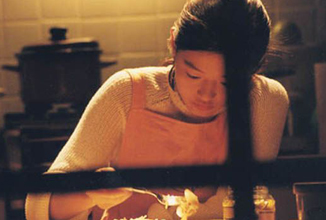 |
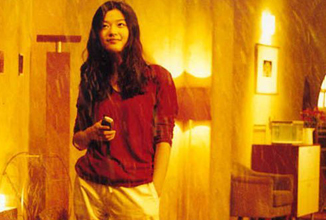 |
Summary:
Il Mare is an enchanting, thought-provoking, heartfelt love story which is beautifully told and I, for one, want to live there.
Actors: Jeon Ji-hyun, Lee Jung-jae
Director: Lee Hyeon-seung
DVD:
The DVD used for this review is the single disc, Hong Kong, region 3 release. The image quality is acceptable throughout although it does tend to be a little grainy in darker scenes, however this is understandable considering the age of the film.
The DTS soundtrack is excellent (as is the normal Dolby Digital version) but it really is a shame that the print wasn't remastered to match the audio quality.
That brings me to the subtitles which are really not good at all. Though the English language used is grammatically correct (for the most part) the actual written words are abysmal with many being cut off - e.g. 'problem' being written as 'proble'. Not only that but statements which are quite long are written right across the width of the screen, often being too long to fit, and for some inexplicable reason this results in the last word (or two) also being cut off - e.g. '...because it's alive' being written as '...because it's a'. Regardless of whether this version was mainly intended for non-English viewers or not these mistakes are appalling. Thankfully working out what the cut off words actually should be isn't that difficult and it must be said that more recent Region 3 releases have much improved English subtitles.
DVD Details:
Format: DVD, NTSC, Widescreen,
Language: Korean
Subtitles: English, Chinese
Region: 3
Studio: Edko Video Entertainment
DVD Extras:
- Theatrical Trailer
- HK TV Spot
- "Must Say Goodbye" MTV
- Photo Gallery
- Cast and Crew Filmographies
|


